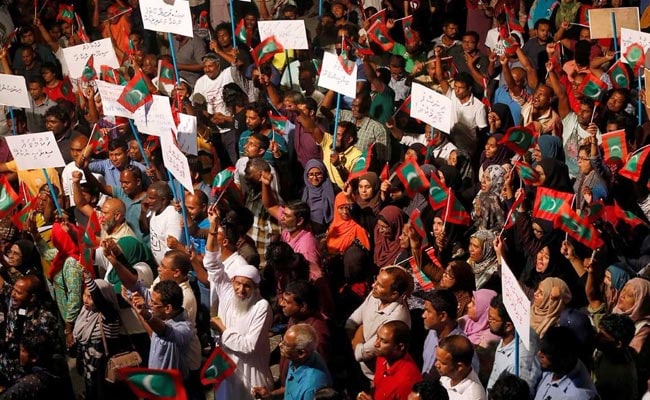
Maldives Crisis: Money Sharma, working as an AFP journalist, was detained by Maldivian authorities.
Two journalists including an Indian national working for a French news agency, who were arrested in Maldives amid the ongoing crisis in the country, will be deported today, an official has confirmed to NDTV.
A statement issued by Maldives Police on Friday said two Agence France-Presse (AFP) journalists, a British national and an Indian, were handed over to immigration authorities for working in Maldives in violation of the immigration law.
The Maldivian government in a press release said the two journalists were in the country on a tourist visa and were working in violation of the immigration law. It also said there would be no other legal steps taken against them. It further said ''immigration laws in the Maldives require all foreign nationals who intend to work to obtain a business or work visa- this applies to all journalists as well''.
The foreign ministry in Delhi had said on Friday that it had received information that an Indian national, Money Sharma, a journalist, was detained by the Maldivian authorities. "We have asked our Embassy to get in touch with the local authorities to ascertain more details of the case," the foreign ministry spokesperson said.
The second journalist was identified as Atish Ravji Patel from London.
 The arrests come amid a massive crackdown after President Abdulla Yameen imposed emergency in the tiny island nation this month and ordered arrest of the Supreme Court Chief Justice and the country's former president Maumoon Abdul Gayoom. The trigger was a verdict by a five-judge bench of the court that quashed terrorism charges against nine prominent opposition leaders including exiled former president Mohamed Nasheed who was expected to head back to contest elections.
The arrests come amid a massive crackdown after President Abdulla Yameen imposed emergency in the tiny island nation this month and ordered arrest of the Supreme Court Chief Justice and the country's former president Maumoon Abdul Gayoom. The trigger was a verdict by a five-judge bench of the court that quashed terrorism charges against nine prominent opposition leaders including exiled former president Mohamed Nasheed who was expected to head back to contest elections.
Mr Nasheed, who is in Colombo, had sought India's military intervention to resolve the island's most serious political crisis in years. India has called the developments "disturbing" in a statement issued after emergency was imposed.
Under the guise of an emergency, Mr Nasheed tweeted, President Yameen had "gone after the opposition, judiciary, parliament, and now the media". He referred to a private television channel, Raajje TV, stopping "broadcast following multiple threats and intimidation from the security services".
"Press freedom must be guaranteed for all," he had said.
Raajje TV, which was seen to highlight the views of the political opposition, said in a statement that it stopped broadcasting because the country's environment does not allow journalists to report freely and independently.
In a late night statement detailing the situation, the Maldives Government declared that the Supreme Court - which had earlier revoked its order to quash terror charges against the opposition leaders - had ordered that individual judges of the Supreme Court could not decide any case and would have to deliver their verdicts by majority of the judges sitting together in the session.
A statement issued by Maldives Police on Friday said two Agence France-Presse (AFP) journalists, a British national and an Indian, were handed over to immigration authorities for working in Maldives in violation of the immigration law.
The Maldivian government in a press release said the two journalists were in the country on a tourist visa and were working in violation of the immigration law. It also said there would be no other legal steps taken against them. It further said ''immigration laws in the Maldives require all foreign nationals who intend to work to obtain a business or work visa- this applies to all journalists as well''.
The foreign ministry in Delhi had said on Friday that it had received information that an Indian national, Money Sharma, a journalist, was detained by the Maldivian authorities. "We have asked our Embassy to get in touch with the local authorities to ascertain more details of the case," the foreign ministry spokesperson said.
The second journalist was identified as Atish Ravji Patel from London.

Maldives has been gripped by dire political crisis.
Mr Nasheed, who is in Colombo, had sought India's military intervention to resolve the island's most serious political crisis in years. India has called the developments "disturbing" in a statement issued after emergency was imposed.
Under the guise of an emergency, Mr Nasheed tweeted, President Yameen had "gone after the opposition, judiciary, parliament, and now the media". He referred to a private television channel, Raajje TV, stopping "broadcast following multiple threats and intimidation from the security services".
"Press freedom must be guaranteed for all," he had said.
Raajje TV, which was seen to highlight the views of the political opposition, said in a statement that it stopped broadcasting because the country's environment does not allow journalists to report freely and independently.
In a late night statement detailing the situation, the Maldives Government declared that the Supreme Court - which had earlier revoked its order to quash terror charges against the opposition leaders - had ordered that individual judges of the Supreme Court could not decide any case and would have to deliver their verdicts by majority of the judges sitting together in the session.
Track Latest News Live on NDTV.com and get news updates from India and around the world

